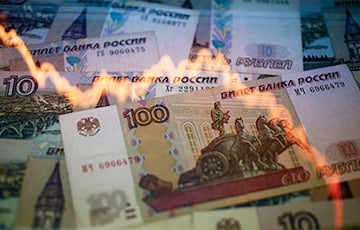Russian Ruble Is Going Down
8- 7.08.2023, 15:28
- 16,686

The Russian economy is rapidly losing export revenues.
The Russian foreign exchange market is still rolling downhill at the same time with falling export revenues and a new wave of assets outflows, the scale of which has already exceeded $250 billion since the start of the war, according to The Moscow Times.
At the auction on Monday, August 7, the dollar and the euro on the Moscow Exchange for the fourth day in a row rewrote records from the first month of the war in Ukraine. The exchange rate of the USD rose to 97.06 rubles, and the EUR - to 106.61 rubles.
Since the beginning of August, traditionally the most unfavorable month for the foreign exchange market, during which the ruble was able to strengthen only 6 times in the three decades after the collapse of the USSR, the dollar and the euro have risen in price by 5% more. Compared to August 2022, rates soared by 57% and 73%, respectively.
The Russian economy is rapidly losing export revenues: according to the Central Bank, this year they will be 30% lower than last year. At the same time, the real inflow of foreign currency (taking into account exports paid "in rubles") may amount to only $250 billion, which will be the lowest value in almost 20 years.
“The market is repeating the scenario of late June and early July, when, in the conditions of low exchange liquidity and the lack of supply of foreign exchange revenues, the increased demand for the currency of a number of large players sharply weakened the position of the Russian rouble,” Yuri Kravchenko, head of the Department for Analysis of Banks and Money Market Veles Capital, said.
“The main sellers of currency left the market in the first days of August - exporting companies converting revenue to pay taxes to the budget,” says Egor Susin, the Managing director of GPB Private Banking. “It’s true that the current dynamics is already a reason for tactical intervention on the part of regulators since it creates risks, perhaps not only inflationary ones.”
But the Russian Central Bank and the Ministry of Finance prefer to observe the situation from the outside. Neither the budget, exporters, nor those involved in real import substitution need a strong ruble, points out Sergei Khestanov, associate professor at the RANEPA.
According to Bloomberg Economics, a ruble appreciation of the dollar brings 100-120 billion rubles of additional revenue to the budget, which desperately needs money to cover the deficit and finance military spending.
The Russian Ministry of Finance is already “rubbing its hands”, hoping to patch up the budget hole with devaluation. The government will receive about a trillion rubles in oil and gas windfalls in the remaining five months of the year, sources familiar with the Cabinet's calculations told Bloomberg.
“There are no particular doubts about the trend of the ruble with such interests. The speed of the process creates intrigue,” Khestanov says. The dollar may rise to 100 rubles in August, analysts at Alfa-Bank and Tinkoff Investments predict.










